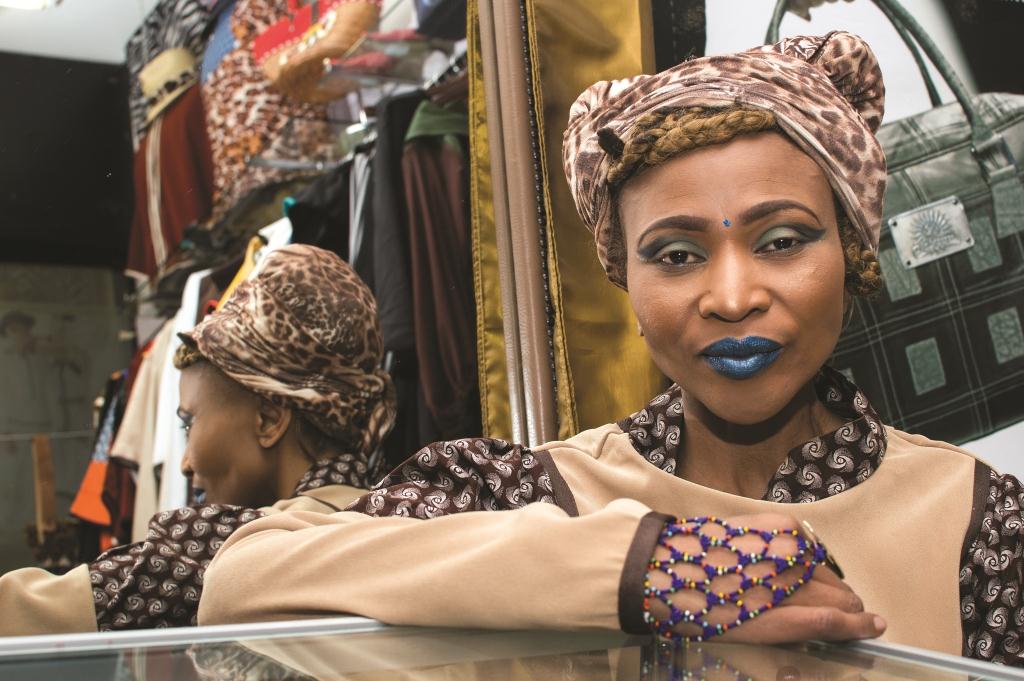They began selling skirts out of the boot of their VW Beetle car in 2000 to friends and family. Sixteen years later, their clothes have been worn at the best fashion shows in Atlanta, Washington, Nigeria, London and India.
It didn’t come easy.
On a balmy Saturday morning, we arrive at the Sun Goddess boutique in Sandton City, a plush mall in Johannesburg, South Africa. What hits you in the face is a bunch of Afro-centric ethnic wear on the racks, a pride and fortune of husband and wife team, Thando and Vanya Mangaliso.
Behind the counter is Vanya; fashion design is her forte. This poised award-winning designer has a petite physique and a headwrap; she has a soft handshake and a striking smile.
Her husband and business partner, Thando, concentrates on retail.
Vanya, 43, was the only child at home, always surrounded by cousins, in the Eastern Cape province of South Africa. She had a passion for reading.
“I grew up in a family of dreamers; grateful for the love of books instilled in me and I guess that continues to fuel my dreams.
“The endless beauty in life, love, family, books, history, the future and our rich heritage. I’m also inspired by the idea of believing there is more and I tend to enjoy the sacrament of work; the desire to rise above mediocrity,” says Vanya.
She worked in the corporate world, in Logistics for Transnet, traveling to different countries: Zambia, Congo and Nigeria, where she noticed that fashion dictated their culture.
“When I’d get off the aeroplane in Nigeria, I’d know I’m in Nigeria, because of their traditional wear. But in South Africa, it was not always the case because fashion didn’t exist as we know it today. It wasn’t always like this. It took a collective effort of community that was transitioning,” says Vanya.
It was those trips that encouraged her to start her own business in fashion.
Vanya’s biggest inspiration is her mother, who always wore Umbaco, a traditional outfit.
She always wondered why people didn’t wear [traditional regalia] regularly. It’s no surprise that she created a business out of this.
“We had to define what the South African aesthetic is. It is not merely taking a normal western t-shirt and put buttons, I mean at the end of the day you have to define the DNA of the South African look.”
Even a good novelist couldn’t have written her story.

The Mangalisos had five stores in Durban, Cape Town and Johannesburg. Managing all shops wasn’t easy. In 2009, they closed three.
“We didn’t have a system that allowed us to manage a shop that was in Durban when we were in Johannesburg so we had to restructure our business. And we opted for the quality of the profit margin as opposed to the quantity,” says Vanya.
They had 150 employees in retail and production but today they have only 20 employees.
The Mangalisos also faced a major setback in their career when their stock of fragrances worth
R2 million ($150,000) got wiped out in one day as a result of a flood at their Rosebank store – a terrible moment.
“I tend not to take things personally at all. It was also a very special and interesting time, making great use of the antagonistic nature of things to rise to greater heights as people,” she says.
In addition to the bad luck she suffered because of nature, there was also an armed robbery at her home in Atholl in Johannesburg, in the middle of the night.
“As it happens you ask yourself how this story is going to end! So helpless, so vulnerable, terrified and sure they clean you out. You can only try to keep calm and be grateful for your lives,” says Vanya.
“I live in the now, fully aware [of living] every moment to the fullest; I tend not to dwell on the dead past or fear the future. I’m also a great believer in letting go of pain once it has served you and so I’m an eternal optimist always looking ahead,” she says.
Even though the Mangalisos struggled with their business, they still believe a loan should be earned.
“When we started the business, we never got a business loan. Having things easy deprives you of being enterprising because as they say necessity is the mother of invention and I think my life is a testament to that,” says Vanya.
Even at their worst time in business, they were creating products to make money. They launched a range of African head gear.
“We’ve become very cut-throat, the business must make money; if it doesn’t make money, we close it. It’s not about your pride; even a fashion line, if it doesn’t make money, we close it. We’ve driven costs down and continued to make sort of the same money,” says Thando.
“With us, it’s all or nothing. If I don’t sell a skirt I don’t eat,” says Vanya.
